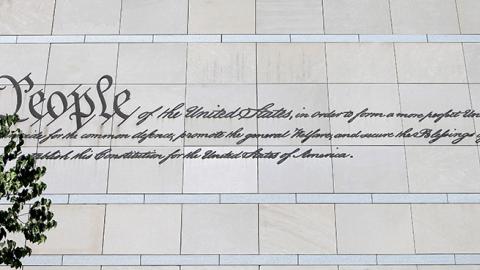Sept. 17 marks the 230th anniversary of the signing of the Constitution, and the beginning of a four-part series on the separation of powers and the first three articles of our founding document. To start, Hans A. von Spakovsky examined why the separation of powers was important to the Founders and the challenges the concept faces today. Next, Christopher DeMuth explores Article I and the legislative branch. Coming up is John Yoo and Saikrishna Prakash on Article II, the executive branch, and former Circuit Judge Michael McConnell on Article III, the judiciary.
*
The Constitution of 1787 begins with its stirring “We the People of the United States” preamble, then turns to Article I, establishing a national Congress. The article takes up more than half the entire document. Article II, establishing the Executive, and Article III, establishing the Judiciary, are much shorter and less detailed.
The Framers devoted special attention to the Congress because it was the linchpin of their new scheme of government. We often think of the separation of powers as the Constitution’s key innovation — checks and balances among Congress, Executive, and Judiciary would police the excesses of power and keep each branch tolerably honest and accountable. But that required an antecedent invention — a powerful, independent legislature.
During the previous century, elected legislatures in Europe, Britain, and the American colonies had been gaining influence, limiting the age-old prerogatives of monarchs and their ministers, courts, and churches. The Framers took the concept of representative lawmaking and ran with it.
They gave Congress “All legislative Powers” (Article I’s opening words), plus exclusive authority over federal taxing, borrowing, and spending. At the same time, they enumerated the permissible subjects of legislation, confining the federal government to matters of importance to the nation as a whole. And they contrived a complex bicameral structure, with distinct forms of election and representation for the House and Senate. These provisions guaranteed that Congress would be attuned to both popular opinion and regional interests — and would be able to legislate only after deliberation and compromise had produced a broad consensus.
In practice, Congress’ role has been less central than the Framers envisaged. Presidents wear the mantle of national leadership, and propose Marshall Plans and wars on poverty and cancer. Justices wear robes and issue august interpretations of the Constitution. Both have often been decisive forces in our government and politics.
In contrast, Congress lacks personality and dignity. It is an amorphous, fractious, vacillating throng, and often the scene of egregious parochialism and favoritism. There have been many rankings of our best and worst presidents, and some of our best and worst justices, but none of our best and worst congresses.
Yet the Congress has been essential to the success and durability of American government:
* It has been a powerful force for expanding individual rights and liberties — from drafting the Bill of Rights in the First Congress to abolishing Jim Crow in the 1960s.
* It has exposed and countered executive misdeeds on numerous occasions, Watergate being only the most famous recent instance.
* It was, through the late 1960s, financially prudent — keeping regular government operations on a balanced budget, borrowing only for wars, emergencies, and investments (beginning with the Louisiana Purchase), and diligently paying down its debts.
Congress is a reactive institution. It often rejects presidential initiatives and Supreme Court pronouncements, but it sometimes embraces them to momentous effect. As a result, praise and blame of Congress frequently reflect immediate partisan affiliations and policy preferences.
But it is important to set aside such opportunistic carping in evaluating today’s Congress. For the institution itself has been in serious decline for several decades, in ways that imperil the constitutional order we all depend on.
Since the early 1970s, Congress has made a practice of ceding lawmaking power to the executive branch. Its statutes call for clean air, safe products, fair treatment of minority groups, and other worthy goals, but leave the difficult choices — the real legislating — to regulatory agencies. When presidents exercise legislative authority on their own (as George W. Bush did during the financial crisis and Barack Obama did on many occasions), Congress frets but usually goes along. One reason the current Congress is having so much difficulty passing health-care and immigration reform is that its members have forgotten the arts of negotiation and compromise.
During the same period, Congress has abandoned all fiscal discipline. It has transferred most federal spending to budget-free “entitlement” programs — and discontinued annual budgets for the remainder, instead passing emergency “continuing resolutions” each fall just to keep the government functioning. In contrast to all previous congresses, recent ones have borrowed continuously to fund routine government operations and income-transfer programs. That is why Congress hates to increase the federal debt ceiling: the ceiling marks the growing chasm between its own spending and taxing decisions, now officially $20 trillion (but in reality much more).
Why Congress has permitted its constitutional powers to atrophy is a complicated puzzle. Some blame partisan polarization and gridlock, others moral turpitude and a shirking of public responsibility.
I think an important reason is the alacrity of modern communications and political organization. Today’s Congress is subject to pressures for government intervention that are far more numerous and insistent than anything in times past. Congress cannot possibly handle all of these issues itself — the Constitution’s deliberately cumbersome structure guarantees that — so it turns them over to missionary executive agencies. It could not possibly fund all the programs its constituents demand with current tax revenues — even with Scandinavian tax rates — so it borrows as necessary.
Whatever the causes, Congress’ abnegations have left us with a national government that is dangerously unbalanced, bureaucratic, and indebted. To the surprise of many, President Trump has been throwing some controversial issues to the Congress rather than deciding them himself. We should all hope that Congress is able to pick up these gauntlets.

















